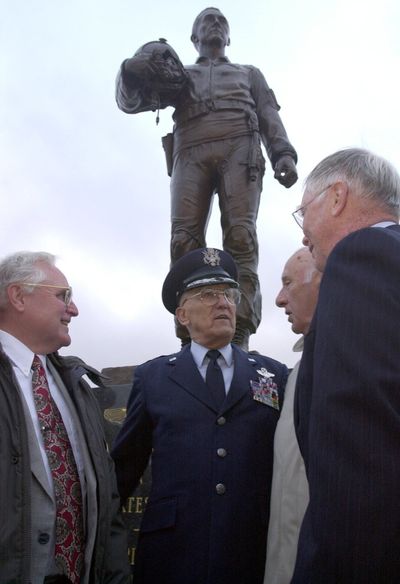Hanoi Hilton prisoner leader Risner, 88, dies
Pilot spent seven years in captivity

The captured fighter pilot had already been through so much at the infamous Hanoi Hilton.
He had been beaten up and starved, thrown for months into a dark cell crawling with rats, held immobile with his legs pinned in stocks, and strapped with ropes so tightly that his right arm was torn from its socket. When he passed out from pain, the ropes were briefly loosened until the ordeal could start yet again.
Now, with his jailers ordering him to do a propaganda broadcast, J. Robinson Risner, in the solitude of his cell, tried to destroy his voice.
“I began pounding my throat as hard as I could,” he wrote in his 1973 memoir “The Passing of the Night.” After he delivered repeated judo chops to his larynx, he drank a paste made from acidic lye soap and intensified the burn by screaming as loud as he could into a rag he clamped over his mouth.
“I continued this for three days and nights,” he wrote, “staying awake as much as possible.”
Ultimately, Risner didn’t lose his voice and had to give the statement. But he deliberately fumbled words and used a stage-y German accent – unmistakable signals of defiance that further infuriated his captors but even more deeply endeared him to the men under his command at the Hoa Lo prison.
Risner, the highest-ranking American POW during most of his seven years, four months and 27 days behind bars, died Oct. 22 at his home in Bridgewater, Va., after a stroke, the Air Force said. The retired brigadier general was 88.
“Robbie” Risner was a rising star in the Air Force when he was shot down and captured Sept. 16, 1965. In the previous decade’s war, he had been a hero, downing eight enemy planes over Korea. In Vietnam, he was such a stand-out that his tanned, chiseled face made the cover of Time magazine with a fighter jet streaking into the sky behind him.
Unfortunately, the April 23, 1965, piece, which profiled a dozen U.S. military members in Vietnam, made its way to Risner’s captors.
It “made him their ‘prized prisoner,’ which meant more abuse,” Gen. Mark A. Welsh III, the Air Force chief of staff, wrote in a remembrance last week. Risner also came in for harsher treatment because, as a lieutenant colonel and then a full colonel, he was the top-ranking officer for most of his imprisonment, including the three years he spent in solitary confinement.
Risner’s credo, according to fellow POW Lee Ellis: “Resist to the point of permanent physical or mental damage and then no more. Give as little as possible and then bounce back to resist again.”
Risner’s leadership was on display when he organized a forbidden worship service in 1971, said Ellis, a corporate consultant who wrote “Leading With Honor: Leadership Lessons From the Hanoi Hilton.”
“It was a big day in our lives,” Ellis told the Los Angeles Times. “We had never done anything this rebellious before.”
Guards stormed into the cellblock and hauled Risner and two other organizers to certain torture. As they did, the 40 or so men in their cellblock burst into “The Star-Spangled Banner.” The other six cellblocks also erupted in the national anthem as the three were marched off.
In 2001, the U.S. Air Force Academy unveiled a statue of Risner. It is 9 feet tall.
The Air Force also presents the Robbie Risner Award in his honor.
Retiring from the Air Force in 1975, Risner raised quarter horses in Texas and spoke at many veterans events.